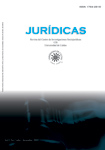Authors
Abstract
This research attempts to revise the concept of legal certainty in three moments: First, from some of its historical stages since it is necessary to consider the relationship lawhistory. A theoretical-historical reference of the background that nominated and built it from the liberal state of law with some references to feudalism and absolute result will be done. Legal certainty will be seen walking about historically above evidence, sometimes behind “legality” and some other times away from it. The analysis of a concept like this supposes a critical context and so it will be done. Secondly, what has been taken for legal certainty in liberalism, that is to say, in the nineteenth-century rationalist legalism and what will be in effect the State Constitution will be treated descriptively. Finally, the relationship legal certainty, transitional justice is suggested, given the dynamics of new and old conflicts (that claim Memory / truth, reparation / symbols and transitional justice rights), baclogged by huge inequalities in addition to the disastrous influences the market on human rights, which makes it necessary to pose some discussion about it in terms of law and politics, this is to say: Transitional Justice. To finish, partial critical conclusions that attempt to convene a review of legal certainty to understand its role in the constitutional State understood as the dimension of the rights and their supremacy character on the legal system, are considered.
Keywords:
References
ARANGO, Rodolfo. Derechos, constitucionalismo y democracia. Bogotá: Universidad Externado de Colombia. 2004.
ATIENZA Manuel. Argumentación jurídica y Estado Constitucional. Anales de jurisprudencia. Sexta época, tercera etapa No 261 Enero-Febrero 2003.
ATIENZA, Manuel. Introducción al derecho. Barcanova editorial. Barcelona. 1985.
VILA CASADO, Iván. Fundamentos del Derecho Constitucional contemporáneo. Editorial Legis. Bogotá.2007.
DE OTTO, Ignacio. Derecho Constitucional. Madrid: Ariel Derecho. 1999.
ECHEVERRY URUBURU, Álvaro. Teoría Constitucional y Ciencia Política. Bogotá. Ediciones Librería del Profesional. 2002.
ESCUDERO ALDAY, Rafael. Positivismo y moral interna del derecho. Editorial Centro de estudios políticos y constitucionales. Madrid. 2000.
FERRAJOLI Luigi. El garantismo y la filosofía del derecho. Bogotá: Universidad Externado de Colombia. 2000.
FERRAJOLI, Luigi. Jurisdicción y democracia, Carbonell, Miguel et al. Jueces y derecho, México, Porrúa-UNAM, 2004.
GONZALO RAMÍREZ, Cleves: Los límites a la reforma constitucional y las garantías límites del poder constituyente: los derechos fundamentales como paradigma. Bogotá: Universidad Externado de Colombia. 2003.
HÄBERLE, Peter. El Estado Constitucional. Universidad Nacional Autónoma de México. México. 2003.
HENKEL, Heinrich. Introducción a la Filosofía del Derecho. Taurus. Madrid. 1968.
KELSEN, Hans. Teoría Pura del Derecho. Bosh, casa editorial. Barcelona. 1971.
LATORRE, Ángel. Introducción al derecho. Ed., Ariel. Barcelona. 1976.
LEGAZ Y LACAMBRA, Luis. Filosofía del derecho. Bosch casa editorial. Barcelona. 1971.
LÓPEZ BLANCO, Hernán Fabio. Instituciones de derecho procesal civil, parte general, tomo I. Editorial Dupré Editores. Bogotá. 2005.
MADRIÑÁN RIVERA, Ramón Eduardo. El Estado Social de Derecho. Bogotá. Ediciones jurídicas Gustavo Ibáñez. 2001.
MONROY CABRA, Marco Gerardo. Concepto de Constitución. Anuario de derecho Constitucional Latinoamericano. 2005.
MONTESQUIEU. Del Espíritu de las Leyes. Edit. Sarpe. Madrid. 1984. libro XI, Cap. VI.
NARANJO MESA, Vladimiro. Teoría Constitucional e Instituciones Políticas. Temis. Bogotá 2003.
PALMER, Valero Ramón. Estructura institucional del Estado. En Manual de ciencia Política. Editor DEL AGUILA Rafael. Editorial Trotta. 2005.
PÉREZ, Luis Carlos. Tratado de Derecho Penal. Editorial Temis. 1978. T III.
PÉREZ LUÑO, Antonio Enrique. Derechos humanos, Estado de Derecho y constitución. Editorial Tecnos. Madrid. 2005.
PÉREZ LUÑO, Antonio-Enrique. Seguridad Jurídica y sistema cautelar. Doxa 7. 1990.
PEREZ LUÑO, Antonio E. Seguridad jurídica. Editores GARZÓN VALDÉS Ernesto y LAPORTA J, Francisco en El derecho y la justicia Editorial Trotta S.A. 2000.
RECASENS SICHES, Luis. Vida humana, sociedad y derecho. Fondo de cultura económica. México. 1945.
RESTREPO VALENCIA, Hernán. Nomoárquica, principialística jurídica o los principios generales del Derecho. Editorial Temis. Bogotá. 1999.
RADBRUCH G., Filosofía del derecho, 4. ed., Editorial Revista de derecho privado, Madrid, 1.959.
ROLDÁN MARTÍNEZ, Luis. SUÁREZ FERNÁNDEZ, Jesús A. Curso de Teoría del Derecho. Ariel Derecho. Barcelona. 1997.
SABINE, George. Historia de la Teoría Política. Fondo de Cultura Económica. México, 1992.
SÁNCHEZ FERRIZ, Remedios. Introducción al Estado Constitucional. Editorial Ariel S.A. Barcelona. 2000.
SÁNCHEZ FERRIZ, Remedios. El Estado Constitucional y su sistema de fuentes. Valencia: Tirant lo Blanch. 2002.
SCHMITT, Carl. La defensa de la Constitución. Madrid: Editorial Tecnos S.A., 1998.
TAMAYO JARAMILLO, Javier. Hermenéutica Constitucional y legal al rescate de la pureza del Derecho. Disponible desde Internet en: http://www.eleccionvisible.com/doc/ternas/CSJ/T1_JTJ/T1_JTJ_LIBRO.pdf
TUGENDHAT Ernest, “Zur Entwicklung von moralischen Begrüdunsstrukuren in modermem Rechts, en ARSP, Neue Folge, 1980.
ZAGREBELSKY, Gustavo. El derecho dúctil. Editorial Trotta.2002.

 PDF (Español)
PDF (Español)
 FLIP
FLIP

















